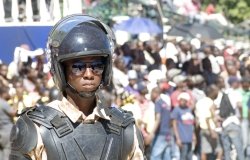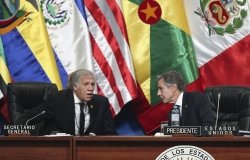The Politics of Trade in Mexico and the United States
On May 23, 2003 the Woodrow Wilson Center Mexico Institute, University of California, Berkeley APEC Study Center, and the Mexican Center for Economic Teaching and Research (CIDE) co-sponsored a seminar at the Wilson Center on the Politics of Trade in Mexico and the United States, with generous funding from US Mexus Riverside. Four speakers and a commentator—Gary Huffbauer from the Institute for International Economics; Antonio Ortíz Mena from CIDE; Jeff Faux from the Economic Policy Institute; Isabel Studer from FLACSO; and Vinod Aggarwal from the University of California, Berkeley—addressed different aspects of trade policymaking in the two countries and pointed to possible scenarios for the future.
Overview
Seminar on
The Politics of Trade in Mexico and the United States
Woodrow Wilson Center
Sixth Floor Board Room
May 23, 2003
News Digest
On May 23, 2003 the Woodrow Wilson Center Mexico Institute, University of California, Berkeley APEC Study Center, and the Mexican Center for Economic Teaching and Research (CIDE) co-sponsored a seminar at the Wilson Center on the Politics of Trade in Mexico and the United States, with generous funding from US Mexus Riverside. Four speakers and a commentator—Gary Huffbauer from the Institute for International Economics; Antonio Ortíz Mena from CIDE; Jeff Faux from the Economic Policy Institute; Isabel Studer from FLACSO; and Vinod Aggarwal from the University of California, Berkeley—addressed different aspects of trade policymaking in the two countries and pointed to possible scenarios for the future.
Antonio Ortíz Mena argued that Mexican trade policy has passed through three phases. The first involved a mostly protectionist orientation in the 1970s and 1980s, largely oriented towards reducing the dependence on the United States and dominated by the Foreign Affairs Ministry. The second phase, throughout the 1990s, involved the reorientation of Mexican trade policy to be the engine of economic development. Coordination of trade policy passed to the Trade and Industry Ministry (SECOFI), which set up a NAFTA negotiating office to conduct negotiations on free trade accords. The third period began with the election of a plural Congress in 1997 and has involved a greater role of the legislative branch in trade policy. So far this has been primarily obstructionist, but possibilities exist for Congress to play a constructive role in the future. There has also been an ongoing tug-of-war between the Economy Ministry (formerly SECOFI) and the Foreign Affairs Ministry to oversee trade policy. If the Foreign Affairs Ministry takes over trade policy again, it is likely to signal a less aggressive strategy of trade openness in Mexico.
For his part, Jeff Faux pointed to the disconnect between the deep economic integration of NAFTA and its weak political development. He argued that the trilateral free trade agreement is political, but that no institutions existed for citizens to be able to take part in discussion about the future of integration among the three countries. During the negotiation of NAFTA, civil society organizations were largely excluded from participation. There was "room next door" for business representatives who were consulted frequently on the progress of the negotiations, but civil society organizations were marginalized, which led to their distrust of NAFTA itself. Today there is no doubt that integration will continue; what needs to be discussed is the terms of that integration and how it can be used to spur equitable development in the three countries. This requires the development of a continental polity with political institutions that allow citizen input into the process.
Isabel Studer argued that the Environmental Side Agreements of NAFTA, though weak in and of themselves, have spurred the growth of the environmental movement in Mexico and provided a forum for environmental NGOs to meet and develop experiences of coordination across the three countries. At least ten of the thirty Commissions created by NAFTA deal with environmental issues. These are poorly linked to the trade aspects of NAFTA. Similarly, the Economics Ministry and the Environmental Ministry have limited coordination on cross-border issues. Nonetheless, the presence of the NAFTA Commissions has provided a useful arena for participation by environmental NGOs and for their growing professionalization and internationalization.
Gary Hufbauer noted that progress on the Free Trade Area of the Americas and on the Doha Round of the World Trade Organization is likely to be slow, and few other free trade agreements with other nations are in sight (including the Central American FTA which appears to be stuck). Ultimately progress on the FTAA would depend a great deal on President Bush's willingness to put energy into the negotiations and the concessions that different parties would be willing to make (which would be painful for all). The lack of progress possible in other areas may open up room for creative progress with NAFTA. This could involve incremental change (resolving current disputes) or a "Big Idea," such as advances on migration, security, energy, or trade policy itself. He suggested that migration would be a difficult topic, but it might be possible to advance on some form of guestworker program and strategies for ameliorating the conditions of migrants (social security harmonization, for example). There could also be progress on energy, especially between the U.S. and Canada, but Mexico needs some form of private investment to avoid running an energy deficit. There are also ways of making progress on security, especially joint processes for vetting visitors to the NAFTA area. Finally there could be progress on "economic efficiency, broadly writ," including mutual recognition of standards in trade.
Seminar on
The Politics of Trade in Mexico and the United States
Woodrow Wilson Center
Sixth Floor Board Room
May 23, 2003
2:00-2:15 Welcome
Joseph S. Tulchin, Woodrow Wilson Center
2:15-4:30 Presentations
Gary Clyde Hufbauer, Institute for International Economics
Antonio Ortíz Mena, CIDE
Jeff Faux, Economic Policy Institute
Isabel Studer, FLACSO-Mexico
Moderator: Vinod K. Aggarwal, University of California, Berkeley
4:30-5:30 Reception
**This project has received generous financial support from UC MEXUS Riverside**
Hosted By

Mexico Institute
The Mexico Institute seeks to improve understanding, communication, and cooperation between Mexico and the United States by promoting original research, encouraging public discussion, and proposing policy options for enhancing the bilateral relationship. A binational Advisory Board, chaired by Luis Téllez and Earl Anthony Wayne, oversees the work of the Mexico Institute. Read more
Thank you for your interest in this event. Please send any feedback or questions to our Events staff.










